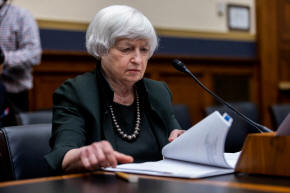Yellen faces grilling in Congress over 'wrong' inflation forecast
 Send a link to a friend
Send a link to a friend
 [June 07, 2022] By
Andrea Shalal, Trevor Hunnicutt and David Lawder [June 07, 2022] By
Andrea Shalal, Trevor Hunnicutt and David Lawder
WASHINGTON (Reuters) - U.S. Treasury
Secretary Janet Yellen faces a gauntlet of tough questions about how the
Biden administration has handled the economy in Congress this week,
after admitting she was "wrong" about the path inflation would take.
Yellen testifies to the Senate Finance Committee Tuesday and the House
of Representatives Ways and Means Committee on Wednesday, thrusting one
of the most experienced, yet least political of Joe Biden's advisers
into the hot seat as Republicans hammer the president over inflation
that has reached 40-year highs.
As Treasury secretary, Yellen, 75, was a key voice predicting price
rises would be "transitory" through 2021 even as some analysts and
investors warned the U.S. economy could overheat. As Fed chair, she was
criticized in 2017 for the opposite - cooling the economy to fight
inflation that never came.
Congressional Republicans plan to grill Yellen on her faulty forecast,
and the role the $1.9 trillion Biden-backed American Rescue Plan had in
driving up prices, aides tell Reuters. They would also like to hear her
abandon Biden's bedrock plan to raise taxes on U.S. companies and seek
more federal funding that would fuel further inflation, Representative
Kevin Brady, the top Republican on the Ways and Means Committee, told
reporters.

Unanticipated, large shocks including Russia's invasion of Ukraine and
recent COVID-19 lockdowns in China have exacerbated the tightness in
supply that has pushed up energy and goods prices in unexpected ways,
Yellen and the White House argue. The "unprecedented" injection of
financial assistance also contributed about 3 percentage points to
inflation by the fourth quarter of 2021, the San Francisco Federal
Reserve Bank.
While Yellen publicly retired the term "transitory" in December, she
continued to reassure White House officials privately early this year
that price pressures would likely ease in 2022, said one person involved
in the talks.
Frustration is high in the White House over a gulf between the strength
of the U.S. economy's recovery from coronavirus shutdowns, with a strong
labor market and record company profits, and Biden's low poll numbers.
While Yellen has no plans and is under no pressure to retire,
conversations about who may replace her have percolated through the
administration in recent months, with Commerce Secretary Gina Raimondo
and former White House COVID-19 coordinator Jeff Zients topping the list
of possible successors.
STAYING ON MESSAGE
On the Hill, Yellen plans to repeat the White House's mantra that
inflation is "the administration's highest priority," a Treasury
official said and that the "the unparalleled strength of America’s
recovery enables our country to address global challenges like inflation
and Russia’s attack on Ukraine from a position of strength."
[to top of second column] |

U.S. Treasury Secretary Janet Yellen looks at her notes as she
testifies during a U.S. House Committee on Financial Services
hearing on the Annual Report of the Financial Stability Oversight
Council, on Capitol Hill in Washington, DC, U.S. May 12, 2022.
Graeme Jennings/Pool via REUTERS

But a forthcoming biography indicates she also harbored concerns that Biden's
signature $1.9 trillion American Rescue Plan, passed by Congress a month after
he took office, would drive up prices.
Ultimately, Yellen "got comfortable" with the size of the relief program,
mindful of the Obama administration's failure to enact a stimulus package large
enough to move beyond the Great Recession, and confident that the Federal
Reserve would respond if inflation surged, according to excerpts from Owen
Ullmann's book "Empathy Economics," due out in September.
Yellen said Saturday that she never pushed for a smaller stimulus package, as
suggested in the book, and that the overall package helped fuel the strong U.S.
recovery.
With limited options to substantially impact gas and food prices, the White
House has embarked on a national roadshow to convince voters the Biden
administration's handling of the U.S. economy has been positive. Biden's
approval ratings have been below 50% since August, raising alarms that his
Democratic Party could lose control of at least one chamber of Congress in the
Nov. 8 midterm election.
Yellen was joined by central bankers and independent economists who shared her
relatively upbeat inflation views, ignoring warnings from strident voices
including former Treasury Secretary Larry Summers about a possibly overheating
economy.
Administration officials concede Yellen's frank admission during a May 31
television interview that she failed to anticipate inflation's path was
politically unwise, but say the Treasury secretary remains one of the most
revered economic voices close to Biden.
Yellen created a smaller stir during a Group of Seven finance ministers meeting
in Germany last month, when she invoked the word "stagflation," a term
associated with 1970s inflation spikes and sluggish growth.
She should choose her words more carefully on the Hill this week, some analysts
say.

“She was the Fed chair and in that position you watch every single word you
say," said Harry Broadman, a former chief of staff of the White House Council of
Economic Advisers and managing director at Berkeley Research Group.
(Reporting by Andrea Shalal, Trevor Hunnicutt and David Lawder; Editing by
Heather Timmons and Andrea Ricci)
[© 2022 Thomson Reuters. All rights
reserved.]This material may not be published,
broadcast, rewritten or redistributed.
Thompson Reuters is solely responsible for this content. |